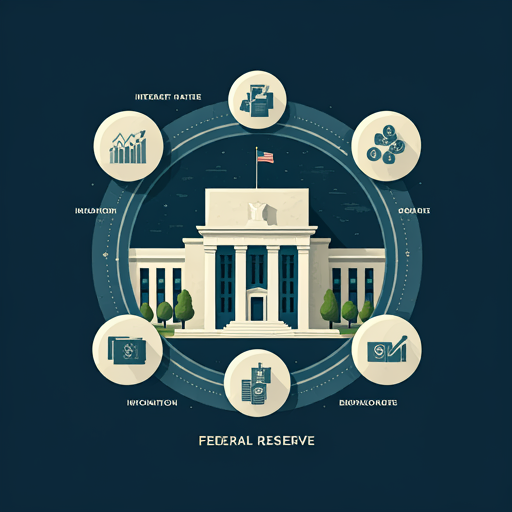Introduction to the Federal Reserve’s Role
Understanding the Federal Reserve System
The Federal Reserve serves as the central bank of the United States , orchestrating monetary policy to promote maximum employment and stable prices. It plays a crucial role in regulating the money supply and influencing interest rates. This ensures economic stability. Understanding its functions is essential for financial literacy. The Fed’s decisions can impact inflation and economic growth. Knowledge is power in finance. By adjusting the federal funds rate, the Fed can stimulate or cool down the economy. This is a vital mechanism.
The Importance of Monetary Policy
Monetary policy is crucial for economic stability, as it directly influences inflation and employment levels. He understands that effective policy can mitigate economic fluctuations. This is essrntial for growth. By adjusting interest rates, he can encourage or discourage borrowing. This impacts consumer spending. Additionally, monetary policy shapes investor confidence in the market. Confidence drives investment decisions. Ultimately, these actions affect overall economic health. Knowledge is vital for informed decisions.
paint Components of Monetary Policy
Interest Rates and Their Impact
Interest rates are a fundamental component of monetary policy , influencing borrowing costs and consumer behavior. He recognizes that lower rates stimulate economic activity. This encourages spending and investment. Conversely, higher rates can curb inflation. This stabilizes the economy.
Key impacts include:
These factors collectively shape economic growth. Understanding these relationships is essential.
Open Market Operations Explained
Here are 10 trending article titles for a financial website based on the latest news and analysis: No input data
Recent Monetary Policy Decisions
Analysis of Recent Rate Changes
Recent rate changes have significant implications for economic activity. He observes that the Federal Reserve’s adjustments aim to control inflation. This is crucial for maintaining price stability. Lowering rates can stimulate borrowing and spending. This boosts economic growth. Conversely, raising rates can help cool an overheating economy.
Key effects include:
These factors influence overall economic health. Understanding these changes is essential.
Quantitative Easing and Tightening
Quantitative easing (QE) involves the central bank purchasing securities to increase the money supply. He understands that this strategy aims to lower interest rates and stimulate economic activity. This can lead to increased lending and investment. Conversely, quantitative tightening (QT) reduces the money supply by selling securities. This can help control inflation.
Key impacts of these policies include:
These actions significantly influence economic conditions. Knowledge is essential for informed decisions.
The Federal Reserve’s Economic Indicators
Inflation Rates and Their Significance
Inflation rahes are critical economic indicators that reflect the rate at which prices rise. He recognizes that sustained inflation can erode purchasing power. This impacts consumer behavior and investment decisions. Conversely, low inflation may signal economic stagnation.
Key implications include:
Understanding these dynamics is essential.
Unemployment Rates and Economic Health
Unemployment rates serve as vital indicators of economic health, reflecting the percentage of the labor force that is jobless. He understands that high unemployment can signal economic distress. This often leads to reduced consumer spending and lower overall demand. Conversely, low unemployment typically indicates a robust economy.
Key effects include:
These factors significantly influence monetary policy decisions. Knowledge is essential for informed analysis.
Impact on Cryptocurrency Markets
Correlation Between Fed Policies and Crypto Prices
Fed policies significantly influence cryptocurrency prices, as changes in interest rates can alter investor sentiment. He notes that lower rates often lead to increased risk appetite. This can drive capital into cryptocurrencies. Conversely, higher rates may prompt investors to seek safer assets.
Key correlations include:
Understanding these dynamics is crucial.
Investor Sentiment and Market Reactions
Investor sentiment plays a crucial role in shaping market reactions, particularly in the volatile cryptocurrency space. He observes that positive news can lead to rapid price increases. This often results in heightened trading activity. Conversely, negative sentiment can trigger sharp sell-offs.
Key factors influencing sentiment include:
Understanding these influences is essential for strategic investing.
Future Projections and Speculations
Potential Changes in Monetary Policy
Potential changes in monetary policy could significantly impact economic conditions. He anticipates that shifts in interest rates may occur based on inflation trends. This can influence borrowing costs and consumer spending. Additionally, adjustments in quantitative easing may be considered.
Key considerations include:
Understanding these factors is crucial. Knowledge is essential for strategic planning.
Implications for the Cryptocurrency Landscape
The implications for the cryptocurrency landscape are significant as monetary policy evolves. He notes that changes in interest rates can affect investor behavior. This may lead to increased volatility in crypto markets. Additionally, regulatory developments could reshape the competitive environment.
Key factors to consider include:
Understanding these dynamics is essential.
Conclusion: Navigating the Intersection of Crypto and Monetary Policy
Strategies for Cryptocurrency Investors
Strategies for cryptocurrency investors should focus on understanding market dynamics influenced by monetary policy. He emphasizes the importance of staying informed about interest rate changes. This knowledge can guide investment decisions. Additionally, diversifying portfolios can mitigate risks associated with volatility.
Key strategies include:
These approaches enhance investment resiliency. Knowledge is essential for success.
Final Thoughts on the Fed’s Influence
The Federal Reserve’s influence on financial markets is profound, particularly regarding cryptocurrency. He recognizes that monetary policy decisions can create ripple effects across asset classes. This often leads to increased volatility in crypto prices. Understanding these dynamics is essential for investors.
Key considerations include:
These factors shape marlet sentiment. Knowledge is crucial for informed investing.
